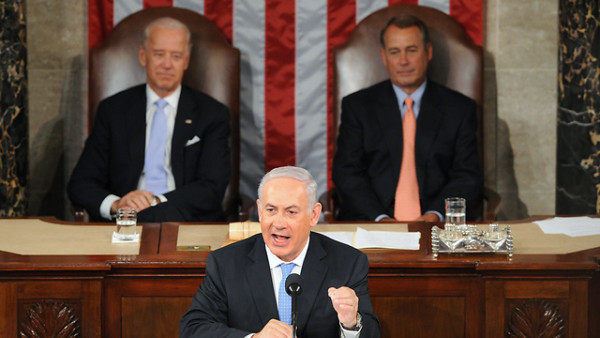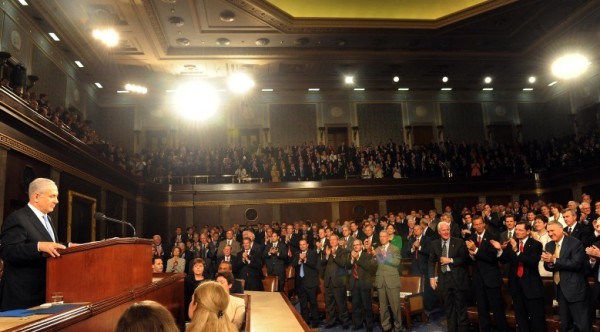Addressing a joint session of the U.S. Congress in Washington, D.C. on March 3, an appearance arranged without the prior knowledge of the Obama administration, Benjamin Netanyahu lambasted the emerging nuclear agreement between the major powers and Iran. Calling it a “very bad deal” that would pave the way for an Iranian nuclear arsenal, he urged the United States to abandon it and hold out for much better terms. Throughout his 39-minute speech, his third to Congress since 1996, he received sustained rounds of standing applause, basking in the adulation.

No doubt he was pleased with his performance in the most important legislature in the world. He had expressed his gratitude to President Barack Obama for his support of Israel. He had said that American backing for Israel transcends partisan politics. He had delivered a strong condemnation of Iran’s hegemonic foreign policy in the Middle East. He had reminded his audience that Iran seeks Israel’s destruction. And most importantly, in his own mind at least, he had made the case for staunchly opposing an accord that would legitimize Iran as a “threshold nuclear state.”
Judging by the often rapturous reaction to his rousing address, Netanyahu had hit all the right buttons. Certainly, Netanyahu put the United States and its international partners on notice that Israel will not accept an agreement that leaves Iran’s nuclear program basically intact. Netanyahu can rest assured that the Republican Party, which controls Congress, will not allow Obama, a Democrat, to ram through a flawed agreement. And with a general election in Israel only two weeks away, Netanyahu scored points among Likud constituents and undecided voters as a resolute leader who can stand up to a superpower in defence of Israel’s national interests.
Upon closer examination, however, Netanyahu’s speech was big on style but small on substance. His skillful rhetorical flourishes notwithstanding, he did not, as Obama correctly observed, break any new ground. He did not offer a realistic and practical alternative. He did not, in short, offer a viable solution that would ease tensions, solve problems or avert war.

As reported in the media, the United States is broadly trying to craft an agreement that would essentially freeze the Iranian nuclear program for about 10 years, cutting off all its paths to building an atomic bomb, in exchange for sanctions relief. Furthermore, if the Iranian regime chose to violate or break the proposed accord, the United States and its partners — Russia, China, France, Britain and Germany — would have about a year in which to take measures against Iran.
It’s not a perfect deal by any means, but as Obama has repeatedly pledged, the United States — Israel’s chief ally and benefactor — is committed to the overarching goal of preventing Iran from obtaining a nuclear weapon. This is Obama’s bottom line, but obviously, Netanyahu has no faith whatsoever in his solemn promise.
There is another factor to consider as well.
In essence, Netanyahu seeks the elimination of Iran’s nuclear capabilities — the dismantlement of its Fordo and Natanz uranium enrichment plants, the closure of its Arak heavy-water plutonium reactor, the shutdown of its uranium ore mines and its scientific laboratories.
It’s a maximalist position that Iran rejects and would doubtlessly spell finis to the current nuclear talks, the best hope of constraining Iran’s nuclear program. As Susan Rice, Obama’s national security advisor, correctly said, “We cannot let a totally unachievable ideal stand in the way of a good deal.”

If the negotiations fail, which is a distinct possibility, Iran would be utterly free to enrich uranium to its heart’s content and upgrade and increase its stock of centrifuges. In other words, the failure of talks would embolden Iran to build a nuclear device, with all its intended or unintended consequences.
Sure, the United States — and Israel — might then attempt to sabotage Iran’s nuclear program, but as we know from past experience, this tactic has not really worked, nor has it deterred Iran.
If Netanyahu is still thinking of resolving the problem by military means, he should immediately forget it. Air strikes, even those carried out by the United States, would slow down, but not destroy, Iran’s nuclear infrastructure, much of which is deeply buried in bunkers resistant to bombing. And it can be safely assumed that a bombing campaign would have the effect of uniting Iranians against an external threat.
If Israel itself rashly bombed Iran’s nuclear facilities, Iran would harshly respond in kind with missile barrages that would probably result in catastrophic civilian casualties and widespread property damage. No wonder this option has been roundly resisted by the last few Israeli chiefs of staff and directors of the Mossad.
Make no mistake. A war with Iran would be absolutely ruinous for Israel, even if it managed to temporarily disable some of its nuclear sites.
As Israeli opposition leader Isaac Herzog has said, Israel will be much better off working with the United States in an effort to restrain Iran.
In the meantime, Netanyahu stands rightly accused of having damaged the fabric of Israel`s alliance with the United States by having accepted John Boehner`s ill-advised invitation to address Congress without Obama`s prior consent. As U.S. Deputy Secretary of State Antony Blinken said the other day, U.S.-Israeli tensions will “continue for the last two years of the Obama administration.

In his speech to Congress, Netanyahu said, “I deeply regret that some perceive my being here as political. That was never my intention.”
These words ring hollow.
Netanyahu committed an egregious error by colluding with Boehner — the Speaker of the House of Representatives — and thereby alienating Obama, who’s a friend and supporter of Israel. He could have spoken to congressional members in a closed-door session outside Congress. He could have conveyed his legitimate concerns and reached many Americans by appearing on TV talk shows.
Israel has bipartisan Republican and Democratic support in Congress, and this must always remain the place if Israel’s crucial strategic relationship with the United States is to prosper and endure. Netanyahu, in reckless and feckless fashion, jeopardized this priceless bond by undermining its bipartisan spirit.

As I write these words, Netanyahu and his supporters may be gloating at a speech well delivered. But they should pause for reflection.
